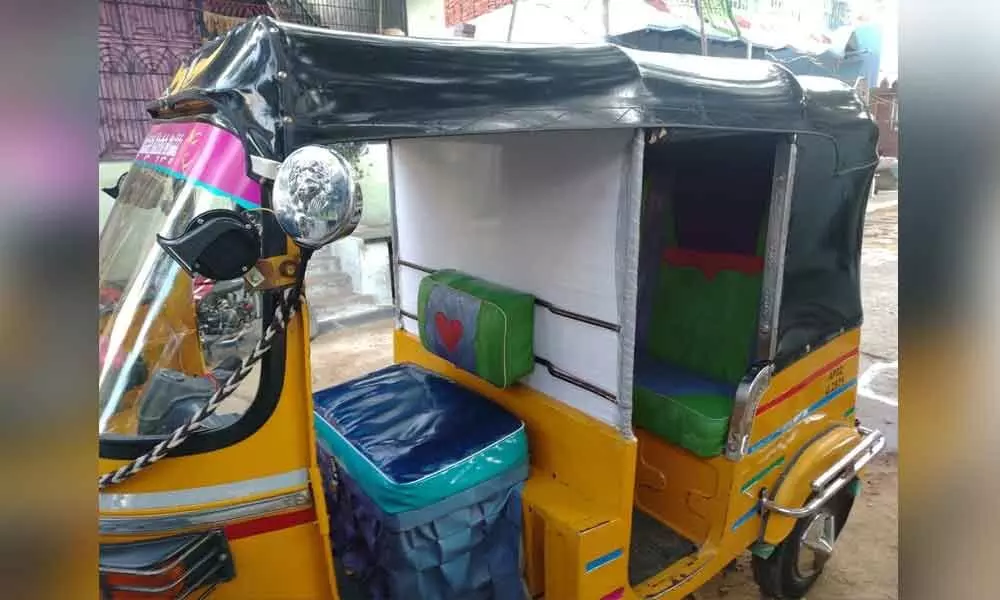Visakhapatnam: Auto-rickshaw drivers stare at a bleak future
 A partition being readied in an auto-rickshaw between the driver and the passengers in times of Covid-19 pandemic in Visakhapatnam
A partition being readied in an auto-rickshaw between the driver and the passengers in times of Covid-19 pandemic in VisakhapatnamAlthough the lockdown 4.0 comes with a bunch of relaxations in the green and orange zones, auto-rickshaw drivers stare at a bleak future as shared trips see a lesser demand among passengers.
• Operating three-wheeler with two commuters per trip is bringing down the income generation capacity of auto-rickshaw drivers
• With the use of sanitisers and partitions in place between the driver and passengers, the drivers lament that they need to invest more to operate the vehicle and fear increased maintenance costs
Visakhapatnam: Although the lockdown 4.0 comes with a bunch of relaxations in the green and orange zones, auto-rickshaw drivers stare at a bleak future as shared trips see a lesser demand among passengers.
Keeping the pandemic in view, maximum two persons are allowed to board an auto-rickshaw. In a city like Visakhapatnam, operating three-wheelers with two persons as potential customers per trip is bringing down the income generation capacity of auto-rickshaw drivers.
Before the lockdown came into force, minimum cost per a shared trip in a three-wheeler is Rs 5 per passenger. Depending on the distance travelled, the cost would go up from Rs 5 to Rs 25. However, after the partial lockdown relaxation, the minimum charge for a trip ranges from Rs 20 to Rs 25.
Given the slashed incomes and growing job cuts, many passengers are reluctant to board an auto spending almost 3-4 times higher than they used to pay earlier. During pre-Covid times, a shared trip in an auto is the most sought-after mode of transport for office-goers and students as it would see not less than 7-10 passengers per trip even if it is at the cost of violating the traffic rules and regulations. The more passengers per trip, the less expensive for travellers and of course, an advantage for auto-drivers too as they could save the fuel cost to a considerable extent.
However, the guidelines of strictly permitting only two passengers in a vehicle seems to be not beneficial either for auto-man or the passenger as the former says the charge is too meager, while the latter does not want to pay more. Hence, the new social distancing norm -- two (passengers)-plus-one (driver) -- is not working out for both the drivers and the passengers. "Expenses have gone up and our income has come down to a large extent. Even to travel for a short distance, we need to shell out more than Rs 20," rues A Kausalya, who resumed her job after a long gap.
With the use of sanitisers and partitions in place between the driver and passengers and also between passengers at the backseat, auto-drivers lament that they need to invest more to operate the vehicle and fear increased maintenance costs. "Following so many dos and don'ts, it is seriously challenging for us to run the three-wheelers. It would be a great relief for us if the government could extend support in terms of providing subsidised fuel and sanitisers at least till the lockdown concludes," opines G. Vamana Murthy, state general secretary of AP Autorickshaw and Motor Workers Union.
Since shared trips have a larger demand in the city, many consider it a viable option to invest in an autorickshaw and an opportunity for self-employment. The city has 27,500 autos and close to 48,000 three-wheelers ply across the district. However, many auto-drivers find it tough to meet the maintenance costs as two-plus-one concept is proving costly for them.
Briefing on the guidelines, Deputy Transport Commissioner G C Raja Ratnam says, "Some autorickshaw drivers are making arrangements to have partitions both for passengers' seat as well as the additional-seat. There is no permission for such alterations according to the guidelines."








